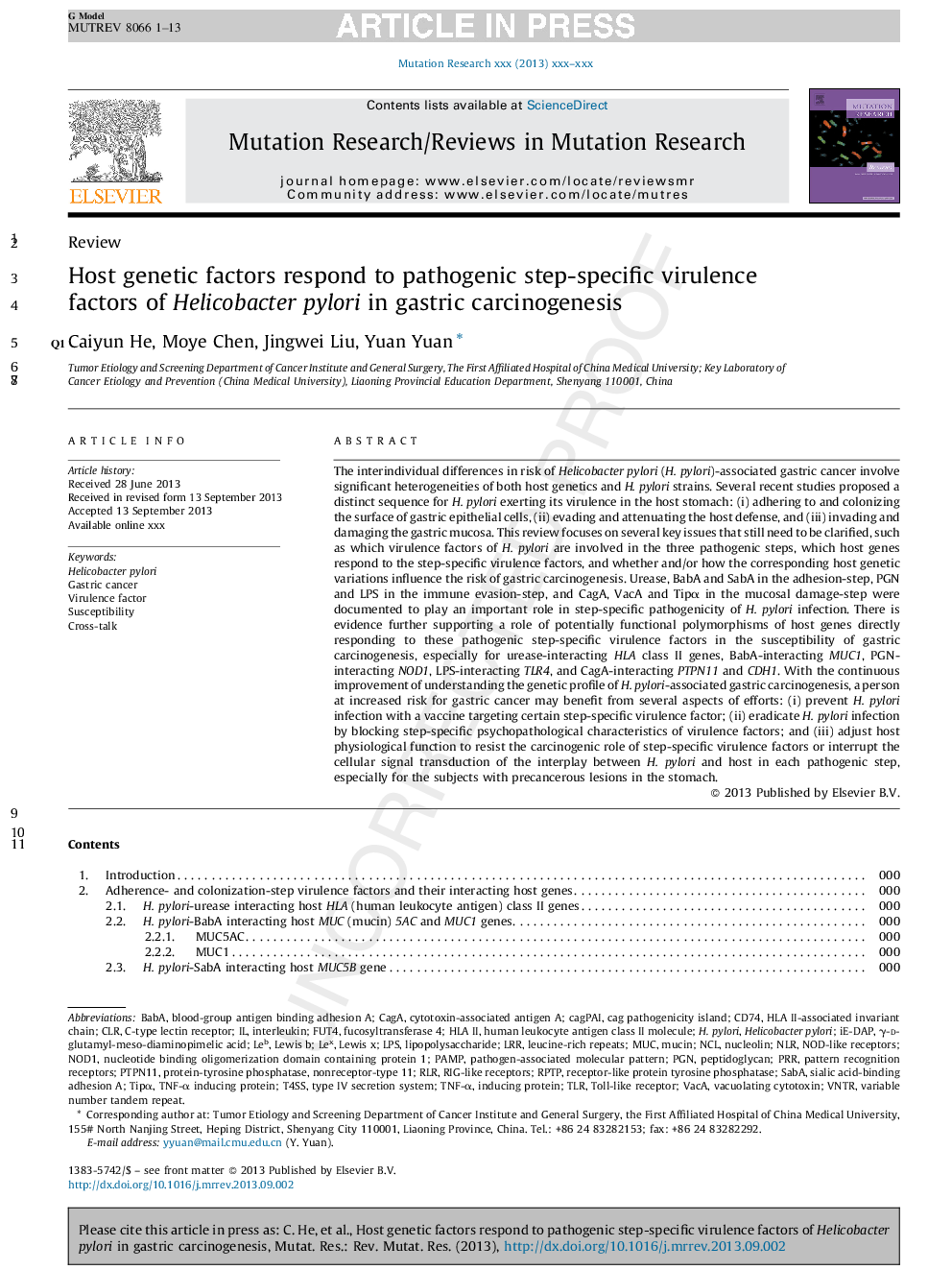| کد مقاله | کد نشریه | سال انتشار | مقاله انگلیسی | نسخه تمام متن |
|---|---|---|---|---|
| 8456730 | 1548755 | 2014 | 13 صفحه PDF | دانلود رایگان |
عنوان انگلیسی مقاله ISI
Host genetic factors respond to pathogenic step-specific virulence factors of Helicobacter pylori in gastric carcinogenesis
ترجمه فارسی عنوان
عوامل ژنتیک میزبان به عوامل بیماریزای خاص ویروس شناسی هلیکوباکتر پیلوری در سرطان معده واکنش نشان می دهند
دانلود مقاله + سفارش ترجمه
دانلود مقاله ISI انگلیسی
رایگان برای ایرانیان
کلمات کلیدی
VacACD74NCLNLRNOD1LeXH. pyloriiE-DAPRPTPLPSRLRcagPAISABALRRPGNcagAT4SSPTPN11PRRMUCTLRPAMPVNTRLEBReceptor-like protein tyrosine phosphataseCLRcytotoxin-associated antigen Apathogen-associated molecular pattern - الگوی مولکولی وابسته به پاتوژنinterleukin - اینترلوکینBABA - باباvariable number tandem repeat - تکرار تعداد متغیرLeucine-rich repeats - تکرار غنی از لوسینToll-like receptor - تیالآرcag pathogenicity island - جزایر پاتوژنز cagCross-talk - حرف زدنSusceptibility - حساسیتGastric cancer - سرطان معدهVacuolating cytotoxin - سیتوتوکسین انباشته شدهType IV secretion system - سیستم ترشحی نوع IVVirulence factor - عامل ویروژنTNF-α - فاکتور نکروز توموری آلفاLewis x - لوئیس xLewis b - لوئیس بlipopolysaccharide - لیپوپلی ساکاریدMucin - موسین Nucleolin - نولولینHelicobacter pylori - هلیکوباکتر پیلوریPeptidoglycan - پپتیدوگلیکانC-type lectin receptor - گیرنده لکتین نوع CNOD-like receptors - گیرنده های NOD مانندpattern recognition receptors - گیرنده های تشخیص الگو
موضوعات مرتبط
علوم زیستی و بیوفناوری
بیوشیمی، ژنتیک و زیست شناسی مولکولی
تحقیقات سرطان
چکیده انگلیسی
The interindividual differences in risk of Helicobacter pylori (H. pylori)-associated gastric cancer involve significant heterogeneities of both host genetics and H. pylori strains. Several recent studies proposed a distinct sequence for H. pylori exerting its virulence in the host stomach: (i) adhering to and colonizing the surface of gastric epithelial cells, (ii) evading and attenuating the host defense, and (iii) invading and damaging the gastric mucosa. This review focuses on several key issues that still need to be clarified, such as which virulence factors of H. pylori are involved in the three pathogenic steps, which host genes respond to the step-specific virulence factors, and whether and/or how the corresponding host genetic variations influence the risk of gastric carcinogenesis. Urease, BabA and SabA in the adhesion-step, PGN and LPS in the immune evasion-step, and CagA, VacA and Tipα in the mucosal damage-step were documented to play an important role in step-specific pathogenicity of H. pylori infection. There is evidence further supporting a role of potentially functional polymorphisms of host genes directly responding to these pathogenic step-specific virulence factors in the susceptibility of gastric carcinogenesis, especially for urease-interacting HLA class II genes, BabA-interacting MUC1, PGN-interacting NOD1, LPS-interacting TLR4, and CagA-interacting PTPN11 and CDH1. With the continuous improvement of understanding the genetic profile of H. pylori-associated gastric carcinogenesis, a person at increased risk for gastric cancer may benefit from several aspects of efforts: (i) prevent H. pylori infection with a vaccine targeting certain step-specific virulence factor; (ii) eradicate H. pylori infection by blocking step-specific psychopathological characteristics of virulence factors; and (iii) adjust host physiological function to resist the carcinogenic role of step-specific virulence factors or interrupt the cellular signal transduction of the interplay between H. pylori and host in each pathogenic step, especially for the subjects with precancerous lesions in the stomach.
ناشر
Database: Elsevier - ScienceDirect (ساینس دایرکت)
Journal: Mutation Research/Reviews in Mutation Research - Volume 759, JanuaryâMarch 2014, Pages 14-26
Journal: Mutation Research/Reviews in Mutation Research - Volume 759, JanuaryâMarch 2014, Pages 14-26
نویسندگان
Caiyun He, Moye Chen, Jingwei Liu, Yuan Yuan,
